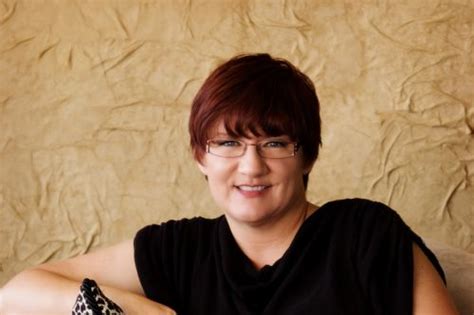A Quote by Richelle Mead
If he wants to tell you, he'll tell you. End of story, Rose. Besides, you certainly keep your share of secrets too. You two have a lot in common." "Are you kidding? He's arrogant, sarcastic, likes to intimidate people, and—oh." Okay. Maybe she had a point.
Related Quotes
If a woman wants to succeed in the public arena, she needs to grow skin as thick as the hide of a rhinoceros. I have certainly, as you can tell, have had to learn how to do that, and there's a lot of good moisturizers I can tell you about if you're interested. The second thing is to learn how to take criticism seriously but not personally.
If you gauge how you're doing on whether somebody is responding vocally or not, you're up a creek. You can't do that; you kind of have to be inside of your work and play the scene. And tell the story every day. Tell the story. Tell the story. Regardless of how people are responding, I'm going to tell the story.
I honestly would tell anyone young to start looking at stories and learning story, because I think that’s the next step after people go, ‘OK, I’ve had enough of that improvisation, I’ve had enough of those short comedy bits. Tell me a story, tell me a more complex story, something that lasts and maybe has a little more meaning to it.’ Don’t ever look at what’s happening now; look at what’s coming next.
I've found great virtue in two-thirds of the way into the message; right before I'm really want to nail home a point, pausing to tell a joke or to tell a light-hearted story, because I know my audience has been working with me now for 20 or 25 minutes. And if I can get them to laugh, get oxygen into their system, it wakes up those who might be sleeping, so there's something about using a story to draw people back in right before you drive home your final point. In that case I think it's real legitimate just to use a story for story's sake.
The best time to tell your story is when you have to tell your story. When it's not really a choice. But then, when you get that first, messy, complicated version down, you have to read it over and be very tough on yourself and ask, 'Well what's the story here?' If you're lucky enough to have someone you trust looking over your shoulder, he or she can help you if [you] lack perspective on your own story.
Oh, I forgot to tell you," Cookie said. "Amber wants your dad to get a teriyaki machine so she can sing for all the lonely barflies." "I'm a good singer, mom." Only a twelve-year-old could make the word mom sound blasphemous. I leaned into Cookie, "Does she know its not called--?" "No," she whispered. "Are you gonna tell her?" "No. It's much funnier this way.
America has this fascination with glorifying the villain and not talking about the trials and tribulations. We tell the story of the successful villain a lot of times, but we don't tell the story of the people who don't come out so successful, and we don't tell the story of all the bystanders of that choice.
We are the rags to riches story okay the Robertson's are. Okay? We had very humble beginnings. Everybody's trying to figure out what, what's behind it, and all the Robertsons say, 'hey, it's divine intervention.' Me personally okay, God's gonna take "Duck Dynasty" where he wants it to go okay and to the people that he wants it to go to.


































